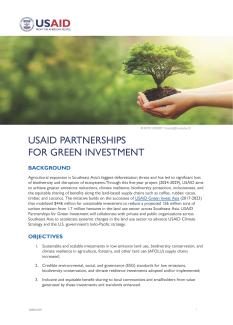BACKGROUND
Agricultural expansion is Southeast Asia's biggest deforestation threat and has led to significant loss of biodiversity and disruption of ecosystems. Through this five-year project (2024-2029), USAID aims to achieve greater emissions reductions, climate resilience, biodiversity protection, inclusiveness, and the equitable sharing of benefits along the land-based supply chains such as coffee, rubber, cacao, timber, and coconut. The initiative builds on the successes of USAID Green Invest Asia (2017-2023) that mobilized $446 million for sustainable investment to reduce a projected 156 million tons of carbon emission from 1.7 million hectares in the land use sector across Southeast Asia. USAID Partnerships for Green Investment will collaborate with private and public organizations across Southeast Asia to accelerate systemic changes in the land use sector to advance USAID Climate Strategy and the U.S. government’s Indo-Pacific strategy.
OBJECTIVES
- Sustainable and scalable investments in low emission land use, biodiversity conservation, and climate resilience in agriculture, forestry, and other land use (AFOLU) supply chains increased;
- Credible environmental, social, and governance (ESG) standards for low emissions, biodiversity conservation, and climate resilience investments adopted and/or implemented;
- Inclusive and equitable benefit sharing to local communities and smallholders from value generated by these investments and standards enhanced.
ANTICIPATED RESULTS
- At least $200 million mobilized to support sustainable investments as well as inclusive and equitable benefit-sharing, resulting in 50 million tons of emissions reductions based on 15-year projections, and 1.5 million hectares of improved natural resource management;
- Strategic partnerships for systemic change in locally-led development in the AFOLU sector that accelerate net-zero, nature-positive, and climate resilient operations at a regional scale.
For more information, please visit http://www.usaid.gov/asia-regional or email info-rdma@usaid.gov.


